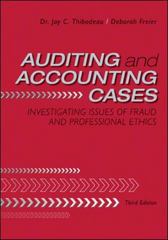Under Generally Accepted Accounting Principles (GAAP), a cost can be capitalized if it provides economic benefits to
Question:
Under Generally Accepted Accounting Principles (GAAP), a cost can be capitalized if it provides economic benefits to be used or consumed in future operations.
A company is required to write off, as a current period expense, any deferred costs at the time the company learns that the underlying assets have been either impaired or abandoned. Any costs to repair or return property to its original condition are required to be expensed when incurred. Finally, interest can be capitalized as part of the cost of acquiring assets for the period of time that it takes to put the asset in the condition required for its intended use. However, GAAP requires that the capitalization of interest must cease once the asset is substantially ready for its intended use.
Waste Management capitalized the costs related to obtaining the required permits to develop and expand its many landfills. It also capitalized interest on landfill construction costs, as well as costs related to systems development at its landfills.
As part of its normal business operations, Waste Management allocated substantial resources toward the development of new landfills and the expansion of existing landfills. A significant part of the landfill development and expansion costs related to the process of obtaining required permits from government authorities. Over the years, the company faced increasing difficulty in obtaining the required landfill permits, and had already invested significantly in many projects that had to be abandoned or were materially impaired when the required permits could not be obtained.
The company routinely capitalized the costs related to obtaining the required permits, so it could defer recording expenses related to those landfills until they were put into productive use. However, instead of writing off the costs related to impaired and/or abandoned landfill projects and disclosing the impact of such write-offs, management disclosed in its Form 10-K filed with the SEC only the risk of future write-offs related to such projects.
The management team of Waste Management also allegedly transferred the costs of unsuccessful efforts to obtain permits to other sites that had received permits or sites for which the company was still seeking permits. In effect, it was commingling impaired or abandoned landfill project costs with the costs of a permitted site (a practice known as “basketing,” which did not comply with GAAP). In addition to basketing, the company also allegedly transferred unamortized costs from landfill facilities that had closed earlier than expected to other facilities that were still in operation (a practice known as “bundling,” which also did not comply with GAAP). Management never disclosed the use of bundling or basketing in its Form 10-Ks.
In 1994, after its auditor Arthur Andersen discovered these practices, management allegedly agreed to write off $40 million related to dead projects over a span of 10 years, and also promised to write off future impairments and abandonments in a prompt manner. However, during 1994, 1995, 1996, and 1997, management effectively buried the write-offs related to abandoned and impaired projects by netting them against other gains, as opposed to identifying the costs separately as it had promised Andersen.
Case Questions
1. Consider the principles, assumptions, and constraints of Generally Accepted Accounting Principles (GAAP). What is the specific definition of an asset?
2. Consider the practices of basketing and bundling. Briefly explain why each practice is not appropriate under GAAP.
3. Describe why netting write-offs against other gains would be effective for Waste Management’s management team in trying to cover up their fraudulent behavior.
4. As an auditor, what type of evidence would allow you to detect whether your client was engaging in behaviors that are designed to mask fraudulent behavior (such as basketing, bundling, or netting)?
5. Consider the decision by CFO James Koenig and Corporate Controller Thomas Hau to phase in the new GAAP method to capitalize interest expense over three years. Do you believe that this decision was in the best interests of the shareholders in the long run? Why or why not?
Step by Step Answer:

Auditing And Accounting Cases Investigating Issues Of Fraud And Professional Ethics
ISBN: 9780078110818
3rd Edition
Authors: Jay Thibodeau, Deborah Freier





